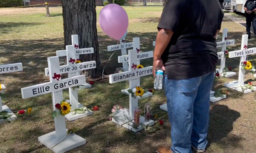I am going to keep this short and simple for two reasons. One, I am writing on the morning of Memorial Day, and I want to celebrate the holiday and spend time with my family. Our grandson Angel, who is graduating from high school on June 6, and from a Chicago Police and Fire Training Academy program on June 1, is coming with his father to earn $20 from me for assembling the brand-new outdoor grill I bought Saturday at Menard’s, and we will plan his graduation party. So, there is all that. Two, the coverage of the mass murder of school children at Robb Elementary School in Uvalde, Texas, has received nearly wall-to-wall coverage in the news media, so it’s not clear I need to add to all that, other than to note that the tragedy of gun violence was perpetuated just yesterday by some shooting in downtown Chattanooga, Tennessee, that wounded six teenagers and sent yet more police officers into a scramble to sort out who did what and to rescue the victims. Gun violence comes in various forms, not just mass murders, but one wonders when it will end and what it will take to wake up the most stubborn defenders of indefensible views of Second Amendment rights. Those rights are real, within limits, as all rights are, but they do not and should not tower above all other rights in a civilized society. If, that is, we are willing to consider the United States of America in 2022 civilized.
It is all getting old, very old. Consider the lineup of just some of the major incidents with mass murders in the past decade:
- Sandy Hook Elementary, Newtown, Connecticut—27 dead, 2 injured
- Aurora Theater Shooting, Aurora, Colorado—12 dead, 70 injured
- Washington Navy Yard, Washington, D.C.—12 dead, 8 injured
- San Bernardino Mass Shooting, San Bernardino, California—14 dead, 21 injured
- Orlando Night Club Massacre, Orlando, Florida—49 dead, 53 injured
- Las Vegas Strip Massacre, Las Vegas, Nevada—58 dead, 546 injured
- Texas First Baptist Church Massacre, Sutherland Springs, Texas—26 dead, 20 injured
- Santa Fe High School Shooting, Santa Fe, New Mexico—10 dead, 13 injured
- Tree of Life Synagogue Shooting, Pittsburgh, Pennsylvania—11 dead, 6 injured
- Thousand Oaks Nightclub Shooting, Thousand Oaks, California—12 dead, 22 injured
- Virginia Beach Municipal Building Shooting, Virginia Beach, Virginia—12 dead, 4 injured
- El Paso Walmart Shooting, El Paso, Texas—22 dead, 26 injured
- Boulder Supermarket Shooting, Boulder, Colorado—10 dead
- Buffalo Supermarket Shooting, Buffalo, New York—10 dead, 3 injured
- Robb Elementary School Massacre, Uvalde, Texas—21 dead, 17 injured
The Mother Jones site from which I pulled the above data lists 129 such events dating back to 1982 with three or more fatalities, of which I used only those since 2012 where the dead numbered in double digits. Although Mother Jones does not offer an overall tally, the numbers climb well into the hundreds of dead and hundreds of injured, and well, at some point, what’s the point of counting. There may well be more next week. There were only ten days between the most recent incidents in Buffalo and Uvalde, Texas, which alone produced 31 deaths and 20 injuries. It is a terrifying tally.
America’s problem, moreover, is not limited to mass shootings, which unquestionably produce the most news coverage. But gang shootings in cities big and small (yes, including but hardly unique to Chicago), domestic violence, suicides, arguments in bars, and heaven knows how many other circumstances involving people with firearms produced, according to the Pew Research Center, more than 45,000 deaths from gun violence in 2020, the most recent year for which complete data have been compiled. Add that up over a decade, and we have numbers that rival the sacrifices of American military heroes in the largest and most violent wars this nation has ever fought, including both World War II and the Civil War.
That leads me to a modest proposal, probably one that is well ahead of its time, but the fight for a holiday to honor the Rev. Dr. Martin Luther King, Jr., took three decades to become a reality. On Memorial Day, however controversial my suggestion may be, and I expect some pushback, I must wonder if the time has come to begin to consider a Gun Victims Memorial Day. Someday, if we are in fact the civilized nation we imagine ourselves to be, we will look back in amazement that we tolerated all this for so long, listened to inane arguments against even the most basic proposals for gun control, such as banning assault weapons or at least raising the age requirements for purchasing such weapons, or instituting universal background checks, and wonder, as other nations do, as we still do regarding racial equality and civil rights, why we ever had to fight so hard for something so sane and so simple. And a Gun Victims Memorial Day would help us to tell each other at that time in our future, “Never again.”
It does not matter what day we choose. Gun violence happens every day in America. The dates of various mass murders pile up almost weekly now. The National Rifle Association, governors and senators and other public officials enslaved to the NRA, all repeat the same tired assertion that guns don’t kill people, people kill people, as if just anyone with a butcher knife could rain down terror on a school or a concert in mere minutes, as if . . . . well, one could go on, but as I say, what is the point of repeating the obvious? Let’s get to work removing the obstacles to justice from public office. That is the first step toward honoring the memory of so many who have died so unnecessarily, so gruesomely.
Jim Schwab

